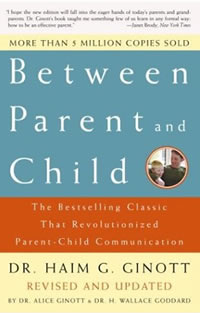
We all feel divided at times, frustrated and torn by specific parenting dilemmas. We feel an impulse to act in one way—but have a nagging uncertainty. Am I really doing (or planning to do) the right thing? Other times, we simply don’t know what to do. That feeling of perplexity is one of the burdens of parenting.
Sometimes patterns develop that start to hold a relationship hostage. Maybe we are regularly sharp or impatient with one child. Or maybe we feel that a child is contrary or rebellious. Or maybe we’re worried that a child is irresponsible.
I want to suggest a way to deal with those knotty difficulties according to the pattern described in previous articles about godly parenting. Think of a parenting challenge that you have been wrestling with. Maybe you have continuing tension in your relationship with one child. Or maybe you worry about the decisions of another. Close your eyes and revisit times when you’ve felt a concern about one of your children. Have that situation in mind as you work through these five sections.
1. Be a flourishing person.
When we are unhappy, frustrated, angry, confused, aimless, and empty, we won’t be doing our best work as parents. While we may not be in such extreme places very often, even small doses of unhappiness (or stress or frustration) can get in the way of effective parenting. We’ve all experienced that.
Before we make big parenting decisions, we need to get our minds and hearts right. (Actually, before we make even small parenting decisions, we need to get our minds and hearts right.) So we start not by focusing on the child and the problem, but by focusing on God. In a sense, the key question here is just what Alma asked:
“If ye have experienced a change of heart, and if ye have felt to sing the song of redeeming love, I would ask, can ye feel so now?” (Alma 5:26)
There are really two parts to Alma’s question:
a. Have you ever felt that soul-filling love of God that makes us sing with joy?
b. Do you have that same feeling right now?
If you have never felt that love, the first order of business is to discover it. I encourage you to find something that lifts your spirits. Maybe it is a piece of beautiful music, a scriptural passage, a general conference talk, an inspiring book, or a great story. Let yourself be engulfed by that message. As our spirits soar, the veil is thin. It is then that we are most likely to feel God wrap us in His arms. Nothing is as powerful or as life-changing as feeling God’s love.
Many of us have felt His love trying to break into our lives repeatedly—but we resist it. “You can’t love me when I do so many stupid things!” I encourage you to drop your defenses against God. Read or sing or do the things that thin the veil for you. Let Him grab you with His love. He give us purpose, hope, meaning, energy, direction. He is, after all, the light and life of the world. He is also the light and life of every individual soul—including mine and yours.
Alma’s second question is whether the experience of God’s love is real and present in our souls right now. So, before undertaking any problem-solving venture, fill yourself with that love. Let any troubles be “swallowed up in the joy of Christ” (Alma 31:38).
If you cannot get to such a place of joy right now, put off the problem-solving self-dialogue until you can. Do not grieve the Spirit by rushing into battle unarmed with “the breastplate of righteousness and your feed shod with the preparation of the gospel of peace; Above all, taking the shield of faith, wherewith ye shall be able to quench all the fiery darts of the wicked” (Ephesians 6:14-16).
The surest sign that we are filled with the love of God is that we feel loving toward the people in our lives—even the annoying ones. Do you feel loving toward the person who is currently confusing or frustrating you? When you feel His love and goodness coursing through you, you are ready to solve the problems that burden your family. You are ready to thwart Satan and empower goodness.
2. Have compassion.
Let’s assume that you have thought of a specific parenting challenge that you are dealing with. You are probably very familiar with your logic in the conflict. You may have spent hours thinking about a child’s bad behavior and what it means about the child’s character (or lack thereof). But half of the story tends to get neglected: the child’s side. We know our perceptions, our concerns, our indignation—but we may not fully know or understand the child’s story.
What is life like for my child? What is he or she worried about, burdened by, hurt by? When we can get out of our own concerns and complaints and try to walk a day in their slippers, we may get vital information about what they really want and why they behave the way they do.
People do what they do for reasons that make sense to them. When their action does not make sense to us, it is not because they are bad or crazy; it is because we don’t yet understand them.
There are a lot of reasons that children do what they do.
They may feel tired, sick, or lonely.
They may not know any better.
They may feel stressed and anxious.
They may want to draw us into their lives. They may be desperate for our love and attention.
But, of course, compassion is more than understanding why the child does as he or she does. That alone is challenging. But then we need to communicate that compassion if it is to be effective.
To communicate your compassion, I encourage you to use statements that focus on them and their feelings. It is not the use of “you” or “I” that matters as much as the focus of the message: I’m trying to understand and find words to describe your feeling.
You must be tired of that.
Did you feel humiliated?
I bet you wish things were different.
It is only when the child feels valued and understood that real negotiation can take place. It will not work to get a resolve to do better and then swoop in with announcements of new plans and programs. The foundation for building a new pattern involves the development of genuine compassion.
3. Nurture Once we are feeling peaceful and compassionate, we are ready to craft the message of love that will help the child feel personally valued.
While we may love our children in some global sense, there are times when irritation and frustration block the sense of affection and appreciation that are essential to the relationship. We don’t have the right to correct anyone we don’t love. Love gives us the right to be in a person’s life and the right to influence them.
Consider some words from President Joseph F. Smith. See if you can feel the spirit of his counsel:
Fathers, if you wish your children to be taught in the principles of the gospel, if you wish them to love the truth and understand it, if you wish them to be obedient to and united with you, love them! and prove to them that you do love them by your every word or act to them.
For your own sake, for the love that should exist between you and your boys—however wayward they might be, or one or the other might be, when you speak or talk to them, do it not in anger, do it not harshly, in a condemning spirit. Speak to them kindly; get them down and weep with them if necessary and get them to shed tears with you if possible. Soften their hearts; get them to feel tenderly toward you. Use no lash and no violence, but argue, or rather reason—approach them with reason, with persuasion and love unfeigned. . . . Get them to feel as you feel, have interest in the things in which you take interest, to love the gospel as you love it, to love one another as you love them; to love their parents as the parents love the children. You can’t do it any other way. You can’t do it by unkindness; you cannot do it by driving; our children are like we are; we couldn’t be driven; we can’t be driven now. (Gospel Doctrine, p. 316)
The spirit of irritation must not be the governing principle as we work with our children. Quite the contrary. We can only solve problems and grow heavenward when we are filled with love for them. Nurture invites us to focus on the goodness in our children—on their finest moments, their greatest qualities, and their purest intentions. As we fill our hearts with love for them, we are prepared to solve problems in the Lord’s way.
4. Guide
Guidance is not about making children pay for mistakes but about helping them learn from experience—and there is a vast difference between those two objectives. We are likely to be confused about the difference unless we have peace, compassion, and love in our hearts.
Proper guidance is filled with God’s trademark goodness. It is He who has commanded us to bring up our children in light and truth. It is He whose creativity is filled with lilting goodness.
Sure, there will be consequences. There will be groundings. There will be lost privileges. But the focus must be on teaching, strengthening, and improving. The best guidance leads to better actions and closer relationships.
When we find ourselves defending a disciplinary action, when we find ourselves feeling tense and defensive, there is a good chance that we have acted under the influence of anger and the prince of darkness. Effective guidance brings light.
Once, a sweet mama asked me for counsel in dealing with her 3-year-old son who had suddenly become crazy every time she vacuumed the floor. She was a kind and compassionate person, but she wondered if the only solution was timeout or punishment for the boy. I asked her about what was happening in their family life. Mom was vacuuming more often since she had an infant who was starting to play on the floor. In fact, mama was vacuuming at least once a day instead of the usual weekly routine.
We cannot know exactly what the new vacuuming regimen meant to the 3-year-old. Maybe it seemed to him that every time he started to play, the vacuum came after him.
I suggested that she discuss a vacuuming schedule with her son. Maybe he preferred that she vacuum when he was gone to a neighbor’s house. Maybe she could just alert him and he would retire to his room while she vacuumed. Maybe he could help her vacuum.
She had the discussion with her son and they settled on a vacuuming schedule. The outbursts by her son disappeared.
Not every problem will follow this pattern. But every parenting challenge is properly addressed with compassion, nurture, and wise guidance. We must be careful that we do not wield parenting power recklessly. Power may gain compliance when children are small but it generates resentment that bubbles up in adolescence. If we live by the sword, we will die by the sword.
When God taught the great sermon about power (D&C 121), He described two preconditions:
- Let thy bowels also be full of charity towards all men, and to the household of faith…
- And let virtue garnish thy thoughts unceasingly… (v. 45)
What happens when we are filled with charity and see the good in our children?
Then shall thy confidence wax strong in the presence of God; and the doctrine of the priesthood [or parenting power] shall distil upon thy soul as the dews from heaven. (v. 45)
But that is not all! God offers blessings that extend into eternity!
The Holy Ghost shall be thy constant companion, and thy scepter an unchanging scepter of righteousness and truth; and thy dominion shall be an everlasting dominion, and without compulsory means it shall flow unto thee forever and ever. (v. 46)
As you consider the relationship that has often challenged you, can you see a way to focus on loving and teaching rather than battling and punishing? How can you be more effective in teaching in the spirit of love and encouragement?
5. Have an Eternal Purpose
Part of the problem of parenting is that we are repeatedly blindsided by problems. We are marching merrily through life when a child punches his sister or spills her drink. We are doing well until we are hijacked by life’s wacky fallenness.
But this is no accident; this is quite by design! C. S. Lewis puts this in perspective:
When I come to my evening prayers and try to reckon up the sins of the day, nine times out of ten the most obvious one is some sin against charity; I have sulked or snapped or sneered or snubbed or stormed. And the excuse that immediately springs to my mind is that the provocation was so sudden and unexpected; I was caught off my guard, I had no time to collect myself. . . . Surely what a man does when he is taken off his guard is the best evidence for what sort of man he is? Surely what pops out before the man has time to put on a disguise is the truth? If there are rats in a cellar you are most likely to see them if you go in very suddenly. But the suddenness does not create the rats: it only prevents them from hiding. In the same way the suddenness of the provocation does not make me an ill-tempered man; it only shows me what an ill-tempered man I am. The rats are always there in the cellar, but if you go in shouting and noisily they will have taken cover before you switch on the light. Apparently the rats of resentment and vindictiveness are always there in the cellar of my soul. (Mere Christianity, 1952, New York: HarperCollins, pp.192, 193)
While cool, polite, steady social environments do not test the deeper layers of my character, family life does. It is here that we get the challenges that make us mad more than anywhere else (except maybe traffic!).
God gave us family life as much as anything so we could have lots of practice at keeping an eternal perspective.
Family life invites us to sacrifice our convenience and preferences in order to bless people who are still learning.
Parenting regularly stretches us toward godliness.
Our Partner in the Process
We must be very careful about our strategy for reforming our parenting. We simply cannot remake our characters. As C. S. Lewis reminded us: “After the first few steps in the Christian life we realise that everything which really needs to be done in our souls can be done only by God” (Mere Christianity, 1952, New York: HarperCollins, p. 193).
Thus we learn, in the great scriptural pattern, to constantly call upon God for mercy.
Have mercy that I may be filled with Thy goodness.
Have mercy that I may properly value the children Thou has given me.
Have mercy that I may know their hearts.
Have mercy that I may be a messenger of Thy love.
Have mercy that I may have the wisdom and patience to teach well.
Have mercy that my soul may be reformed in Thy image.
Have mercy and change my heart and my family.
Through His mercy, we can be changed by His grace. With His help—His love, His nurturing kindness, His guidance for us—we can love, nurture, and guide our families in His way.
You can find many of Brother Goddard’s past articles by going to www.DrWally.org
If you are interested in additional ideas for personal well-being, strong marriages, or effective parenting, you are invited to sign up for a free resource we have created at the University of Arkansas Cooperative Extension Service. Navigating Life’s Journey is a weekly e-mail series that offers helpful ideas based on research so you can trust they will work in real life. To sign up for any or all of these resources, go to www.arfamilies.org
Books by Brother Goddard:
YouTube videos on the Atonement





















